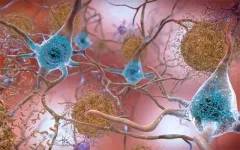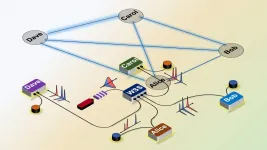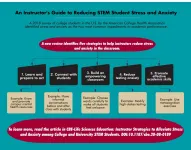(Press-News.org) Amyloid plaques are pathological hallmarks of Alzheimer's disease (AD) -- clumps of misfolded proteins that accumulate in the brain, disrupting and killing neurons and resulting in the progressive cognitive impairment that is characteristic of the widespread neurological disorder.
In a new study, published March 2, 2021 in the Journal of Experimental Medicine (JEM), researchers at University of California San Diego School of Medicine, Massachusetts General Hospital and elsewhere have identified a new drug that could prevent AD by modulating, rather than inhibiting, a key enzyme involved in forming amyloid plaques.
In studies using rodents and monkeys, the researchers report the drug was found to be safe and effective, paving the way for possible clinical trials in humans.
"Alzheimer's disease is an extraordinarily complex and multi-faceted condition that has, so far, defied effective treatment, let alone prevention," said senior author Steven L. Wagner, PhD, professor in the Department of Neurosciences at UC San Diego School of Medicine. "Our findings suggest a potential therapy that might prevent one of the key elements of AD."
Amyloid plaques are composed of small protein fragments called amyloid beta (Aβ) peptides. These peptides are generated by enzymes called β-secretase and γ-secretase, which sequentially cleave a protein called amyloid precursor protein on the surfaces of neurons to release Aβ fragments of varying lengths. Some of these fragments, such as Aβ42, are particularly prone to forming plaques, and their production is elevated in patients with mutations predisposing them to early-onset AD.
Several attempts have been made to treat or prevent AD using drugs that inhibit either β-secretase or γ-secretase, but many of these drugs have proved to be highly toxic or unsafe in humans, likely because β-secretase and γ-secretase are required to cleave additional proteins in the brain and other organs.
Instead, Wagner and colleagues investigated the therapeutic potential of drugs known as γ-secretase modulators or GSMs, which instead of inhibiting the γ-secretase enzyme, slightly alter its activity so that it produces fewer Aβ peptides that are prone to form plaques while continuing to duties cleaving other protein targets.
"GSMs offer the ability to mitigate mechanism-based toxicities associated with γ-secretase inhibitors," said Wagner.
In the new JEM study, researchers created a novel GSM and tested it on mice, rats and macaques. They found that repeated, low doses of the GSM eliminated Aβ42 production in mice and rats, without causing any toxic side effects. The drug was also safe and effective in macaques, reducing Aβ42 levels by up to 70 percent.
The novel GSM was then tested in a mouse model of early-onset AD, treating the animals either before or shortly after they began to form amyloid plaques. In both cases, the novel GSM decreased plaque formation and reduced plaque-associated inflammation, which is thought to contribute to the development of disease.
The findings suggest that the novel GSM could be used prophylactically to prevent AD, write the authors, either in patients with genetic mutations that increase susceptibility to AD or in cases where amyloid plaques have been detected by brain scans.
"In this study, we have pharmacologically characterized a potent GSM that, based on its preclinical attributes, appears to equal or exceed the potency of any previously tested GSMs," said co-author Rudolph Tanzi, PhD, professor neurology at Harvard Medical School and director of the Genetics and Aging Research Unit at Massachusetts General Hospital.
"Future clinical trials will determine whether this promising GSM is safe in humans and could be used to effectively treat or prevent Alzheimer's disease."
An estimated 5 million Americans are living with AD. The number of people with AD doubles every five years beyond age 65, according to the Centers for Disease Control, with the total number of Americans with the disease projected to nearly triple to 14 million by 2060. Currently, there is no known cure, only symptomatic therapies.
INFORMATION:
Co-authors include: Kevin D. Rynearson, Olga Prikhodko, Yuhuan Xie, Phuong Nguyen, Mariko Sawa, Ann Becker, Brian Spencer, Jazmin Florio, Michael Mante, Bahar Salehi, Carlos Arias, Douglas Galasko and William C. Mobley, all at UC San Diego; Robert A. Rissman and Brian P. Head, UC San Diego and Veterans Affairs San Diego Healthcare System; Moorthi Ponnusamy and Gopal Thinakaran, University of South Florida; Can Zhang, Massachusetts General Hospital; Brenda Hug, Veterans Affairs San Diego Healthcare System; Graham Johnson, NuPharmAdvise, New Hampshire; Jiunn H. Lin, Biopharm Consulting Partners, Pennsylvania; and Steven K. Duddy, Integrated Nonclinical Development Solutions.
WEST LAFAYETTE, Ind. -- When quantum computers become more powerful and widespread, they will need a robust quantum internet to communicate.
Purdue University engineers have addressed an issue barring the development of quantum networks that are big enough to reliably support more than a handful of users.
The method, demonstrated in a paper published in Optica, could help lay the groundwork for when a large number of quantum computers, quantum sensors and other quantum technology are ready to go online and communicate with each other.
The team deployed a programmable switch to adjust how much data goes to each ...
Scientists regularly use remote sensing drones and satellites to record how climate change affects permafrost thaw rates -- methods that work well in barren tundra landscapes where there's nothing to obstruct the view.
But in boreal regions, which harbor a significant portion of the world's permafrost, obscuring vegetation can stymy even the most advanced remote sensing technology.
In a study published in January, researchers in Germany and at the University of Alaska Fairbanks' Geophysical Institute developed a method of using satellite imagery to measure the depth of thaw directly above permafrost in boreal ecosystems. Rather than trying to peer past ...
They can hear well up to about forty years old, but then suddenly deafness strikes people with DFNA9. The cells of the inner ear can no longer reverse the damage caused by a genetic defect in their DNA. Researchers at Radboud university medical center have now developed a "genetic patch" for this type of hereditary deafness, with which they can eliminate the problems in the hearing cells. Further research in animals and humans is needed to bring the genetic patch to the clinic as a therapy.
Hereditary deafness can manifest itself in different ways. Often the hereditary defect (mutation) immediately causes deafness from birth. Sometimes, as with DFNA9, you experience the initial ...
Philadelphia, March 2, 2021--Taking the first deep dive into how the immune system is behaving in patients with multisystem inflammatory syndrome in children (MIS-C), researchers at Children's Hospital of Philadelphia (CHOP) and the Perelman School of Medicine at the University of Pennsylvania have found that children with this condition have highly activated immune systems that, in many ways, are more similar to those of adults with severe COVID-19. The results, published today in Science Immunology, show that better understanding the immune activation in patients with MIS-C could not only help better treat those patients but also improve treatment for adults with ...
A new study of patients with Multisystem Inflammatory Syndrome in Children (MIS-C), a rare but severe complication of COVID-19 in children, reveals distinct immune features of COVID-19 not seen in adults that may clue scientists in to why SARS-CoV-2 infection manifests differently in children compared with adults. Their results showed that although the immune landscape in pediatric COVID-19 was similar to that in adults, MIS-C patients uniquely exhibited increased activation of a blood vessel-patrolling CD8+ killer T cell subset, and all pediatric COVID-19 patients harbored greater B cell frequencies for a more prolonged period of time than observed in healthy adults. MIS-C is characterized by pervasive inflammation, an array of symptoms ranging from fever ...
Orange, Calif. - Even before the COVID-19 pandemic, college students were reporting record levels of stress and anxiety. According to the American College Health Association END ...
The Deepwater Horizon disaster began on April 20, 2010 with an explosion on a BP-operated oil drilling rig in the Gulf of Mexico that killed 11 workers. Almost immediately, oil began spilling into the waters of the gulf, an environmental calamity that took months to bring under control, but not before it became the largest oil spill in the history of the petroleum industry.
Nearly 10 years have passed since then, and the oil slick has long since dispersed. Yet, despite early predictions, area wildlife are still feeling the effects of that oil, and research published in Environmental Toxicology and Chemistry has shown that negative health impacts have befallen not only dolphins alive at the time of the spill, but also in their young, born years later.
A team of researchers, including ...
When central nervous system cells in the brain and spine are damaged by disease or injury, they fail to regenerate, limiting the body's ability to recover. In contrast, peripheral nerve cells that serve most other areas of the body are more able to regenerate. Scientists for decades have searched for molecular clues as to why axons -- the threadlike projections which allow communication between central nervous system cells -- cannot repair themselves after stroke, spinal cord damage, or traumatic brain injuries.
In a massive screen of 400 mouse genes, Yale School of Medicine ...
Disruptions in the circadian rhythms in lung cells may explain why adults who survived premature birth are often more at risk of severe influenza infections, suggests a study in mice published today in eLife.
Dramatic improvements in the care of infants born prematurely have allowed many more to survive into adulthood. Yet ex-preemies can face several long-term side effects of the life-saving care they received. The study suggests potential new approaches to treating lasting lung problems in those born prematurely.
Many premature infants are not able to breathe on their own and require oxygen to survive. ...
College course syllabi written in a warm, friendly tone are more likely to encourage students to reach out when they are struggling or need help, a new study from Oregon State University found.
Conversely, when a syllabus is written in a more cold, detached tone, students are less likely to reach out.
The study also compared the effect of syllabus tone with the effect of a deliberate "Reach out for help" statement included in the document.
"The instructor has to ask themselves, what's the first point of contact with the class for the student? In an online class and in remote learning, the syllabus is often the ...



